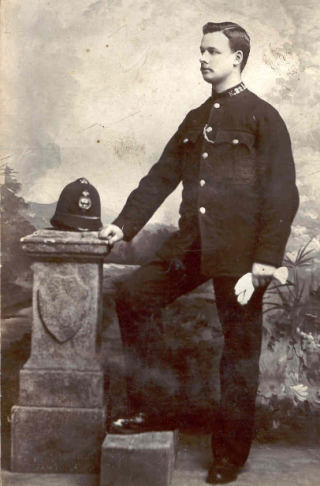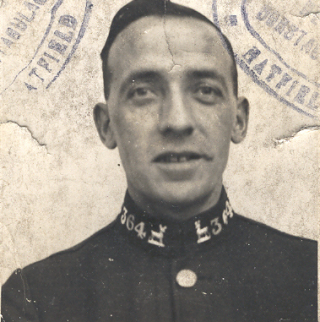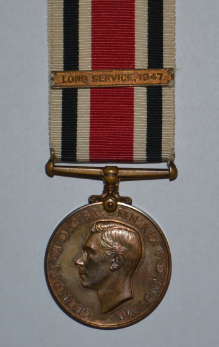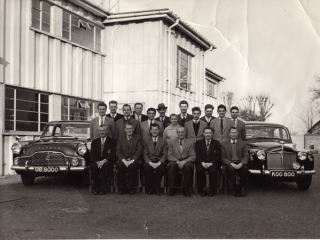Wright - Three Generations of Constables.
Andy Wiseman
On 12th October 1898, Harry Wright joined the Hertfordshire Constabulary. He was allocated warrant number 22 and posted to ‘E’- Division’; which incorporated the principle towns of Stevenage and Hitchin. The force he joined was undergoing a period of modernisation, under its forward-thinking Chief Constable, Henry Smith Daniell. Just five years earlier, Daniell had introduced the Constabulary’s first telephone and authorised the use of pedal cycles for the first time. Meanwhile Hitchin had been provided with a new state of-the-art police station on Bancroft, to replace a ninety-year-old building which had accommodated the police since 1841.
As a young constable, Harry was subject to a strict code of discipline and police regulations, which governed his personal life as much as his working one. The typical working day consisted of three hours of foot patrol in the day time, following by a further six during the hours of darkness. Despite their being some accommodation in the new police station, the number of officers in Hitchin quickly exceeded the number of rooms available. Harry found lodgings in Tilehouse Street, Hitchin.
In September 1904 Harry and another constable named J. D. Robinson, were wrongly accused of stealing nuts from the garden of Mr Daniel Studman of Offley Road, Hitchin. Both were summoned and stood trial at the Quarters Sessions in Hitchin. Having heard the evidence laid by Mr Lathom for the prosecution, the case was thrown out by the bench who promptly concluded that there was “not a word of truth in the evidence”. The “extraordinary case” was reported in the local newspaper, which described the two policemen leaving court “without the slightest stain on their character”. Harry’s career prospered and having served as a Sergeant, he was promoted to Inspector. He retired on 31st October 1923 and died fourteen years later on 19th March 1938.
In 1928, Harry’s son, Frederick Wright followed in his Father’s footsteps by joining Hitchin’s Special Constabulary. He was allocated warrant number 364. After nine years’ service, Frederick received the Special Constabulary Long Service and good conduct medal. During the Second World War an increasing number of Special and Reserve Constables were recruited to police Hertfordshire, in place of 98 regular policemen who had left to join the armed forces.
On 20th May 1944, Frederick was walking his beat when he spotted a soldier riding a bicycle in an erratic manner before falling off. When questioned by Frederick, the soldier gave his name as Charles Berresford, from the Royal Corps of Signals, but was unable to account for why he had the bike in his possession. Having arrested Berresford on suspicion of larceny, Frederick discovered that the bicycle had been stolen from outside the town hall. At his trial, Berresford stated that he had fully intended to replace the bike and so in the absence of an apparent intention to permanently deprive the owner of it, he was found not-guilty. Regardless of the Magistrates’ verdict, Frederick received a commendation from the Special Constabulary’s officer in charge, Commandant Roland Smith. Meanwhile, back at the police station, his colleagues compiled a limerick telling the tale of Frederick’s ‘Special Effort’.
Frederick remained in the Specials after the war and in 1947 was awarded a bronze bar which was attached to his long-service medal, denoting a total of 19 years’ continuous service. Meanwhile, he worked as a manager at Shelvoke & Drewery, Letchworth (manufacturers of commercial vehicles) and lived in Cambridge Road, Hitchin. He died at work in January 1967.
Frederick’s son Peter James Wright was born in 1938. At the age of 18 he joined the Hitchin branch of the Hertfordshire police cadets and remained with them for two years. He then served with the Royal Military police for several years, before returning to the Hertfordshire Constabulary as a regular officer. He later qualified as a Detective Constable. In 1965, Nine Regional Crime Squads were created across the UK and strategically placed to ensure coverage of the whole country. Each team was headed by a Chief Superintendent and consisted of officers who had been specially selected from different forces. Their role was to investigate organised or serious crime which transcended force and regional boundaries. Peter was assigned to ‘number 5 Regional Crime Squad’, which incorporated Hertfordshire and served on the unit throughout the sixties and seventies. Sadly, he died of Motor-Neurone disease in 1980.















Add your comment about this page
I have just discovered this article. Harry Wright was my Grandfather. My father was William (Buster) Wright. I would appreciate any contact with my father’s side of the family.
You can contact me via admin@hertspastpolicing.org.uk and the editors will forward your message to me.
Hello Peter Hockney.
I have some photos of Harry wright and some other paperwork if you would be interested. You can contact me via admin@hertspastpolicing.org.uk and the editors will forward your message to me.
Peter James Wright was my dad , I never knew about this piece of history , thank you , I always believed he died of multiple sclerosis though ?
I am related to the Wrights and was born in Hitchin and lived many years in Stevenage. Rhoda Sarah Wright, Harry’s wife, was my grandmother.
I am writing a book about a Hitchin murder just after the First World War and trying to trace any descendants of Harry Wright. Has anyone any knowledge please?
Frederick’s brother-in-law Ronald Clayton was also in the specials, attaining the rank of sergeant. His daughter, Averil was also a special constable.